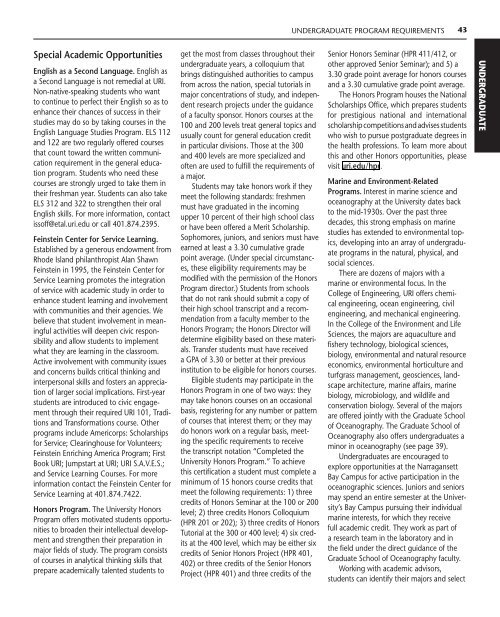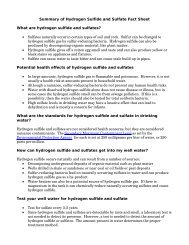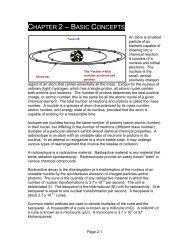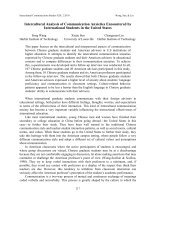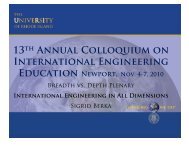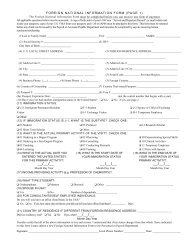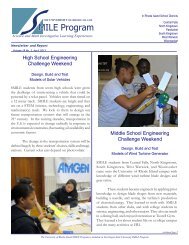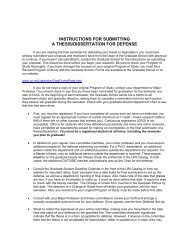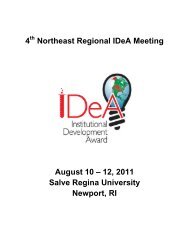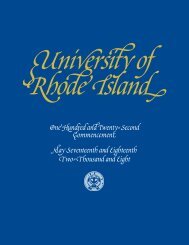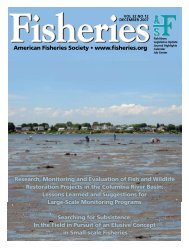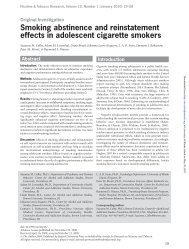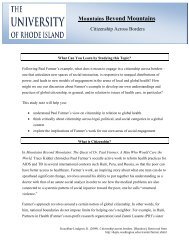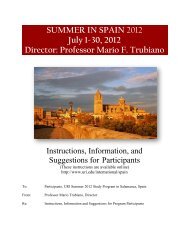UNDERGRADUATE PROGRAMS The - University of Rhode Island
UNDERGRADUATE PROGRAMS The - University of Rhode Island
UNDERGRADUATE PROGRAMS The - University of Rhode Island
You also want an ePaper? Increase the reach of your titles
YUMPU automatically turns print PDFs into web optimized ePapers that Google loves.
Special Academic Opportunities<br />
English as a Second Language. English as<br />
a Second Language is not remedial at URI.<br />
Non-native-speaking students who want<br />
to continue to perfect their English so as to<br />
enhance their chances <strong>of</strong> success in their<br />
studies may do so by taking courses in the<br />
English Language Studies Program. ELS 112<br />
and 122 are two regularly <strong>of</strong>fered courses<br />
that count toward the written communication<br />
requirement in the general education<br />
program. Students who need these<br />
courses are strongly urged to take them in<br />
their freshman year. Students can also take<br />
ELS 312 and 322 to strengthen their oral<br />
English skills. For more information, contact<br />
iss<strong>of</strong>f@etal.uri.edu or call 401.874.2395.<br />
Feinstein Center for Service Learning.<br />
Established by a generous endowment from<br />
<strong>Rhode</strong> <strong>Island</strong> philanthropist Alan Shawn<br />
Feinstein in 1995, the Feinstein Center for<br />
Service Learning promotes the integration<br />
<strong>of</strong> service with academic study in order to<br />
enhance student learning and involvement<br />
with communities and their agencies. We<br />
believe that student involvement in meaningful<br />
activities will deepen civic responsibility<br />
and allow students to implement<br />
what they are learning in the classroom.<br />
Active involvement with community issues<br />
and concerns builds critical thinking and<br />
interpersonal skills and fosters an appreciation<br />
<strong>of</strong> larger social implications. First-year<br />
students are introduced to civic engagement<br />
through their required URI 101, Traditions<br />
and Transformations course. Other<br />
programs include Americorps: Scholarships<br />
for Service; Clearinghouse for Volunteers;<br />
Feinstein Enriching America Program; First<br />
Book URI; Jumpstart at URI; URI S.A.V.E.S.;<br />
and Service Learning Courses. For more<br />
information contact the Feinstein Center for<br />
Service Learning at 401.874.7422.<br />
Honors Program. <strong>The</strong> <strong>University</strong> Honors<br />
Program <strong>of</strong>fers motivated students opportunities<br />
to broaden their intellectual development<br />
and strengthen their preparation in<br />
major fields <strong>of</strong> study. <strong>The</strong> program consists<br />
<strong>of</strong> courses in analytical thinking skills that<br />
prepare academically talented students to<br />
get the most from classes throughout their<br />
undergraduate years, a colloquium that<br />
brings distinguished authorities to campus<br />
from across the nation, special tutorials in<br />
major concentrations <strong>of</strong> study, and independent<br />
research projects under the guidance<br />
<strong>of</strong> a faculty sponsor. Honors courses at the<br />
100 and 200 levels treat general topics and<br />
usually count for general education credit<br />
in particular divisions. Those at the 300<br />
and 400 levels are more specialized and<br />
<strong>of</strong>ten are used to fulfill the requirements <strong>of</strong><br />
a major.<br />
Students may take honors work if they<br />
meet the following standards: freshmen<br />
must have graduated in the incoming<br />
upper 10 percent <strong>of</strong> their high school class<br />
or have been <strong>of</strong>fered a Merit Scholarship.<br />
Sophomores, juniors, and seniors must have<br />
earned at least a 3.30 cumulative grade<br />
point average. (Under special circumstances,<br />
these eligibility requirements may be<br />
modified with the permission <strong>of</strong> the Honors<br />
Program director.) Students from schools<br />
that do not rank should submit a copy <strong>of</strong><br />
their high school transcript and a recommendation<br />
from a faculty member to the<br />
Honors Program; the Honors Director will<br />
determine eligibility based on these materials.<br />
Transfer students must have received<br />
a GPA <strong>of</strong> 3.30 or better at their previous<br />
institution to be eligible for honors courses.<br />
Eligible students may participate in the<br />
Honors Program in one <strong>of</strong> two ways: they<br />
may take honors courses on an occasional<br />
basis, registering for any number or pattern<br />
<strong>of</strong> courses that interest them; or they may<br />
do honors work on a regular basis, meeting<br />
the specific requirements to receive<br />
the transcript notation “Completed the<br />
<strong>University</strong> Honors Program.” To achieve<br />
this certification a student must complete a<br />
minimum <strong>of</strong> 15 honors course credits that<br />
meet the following requirements: 1) three<br />
credits <strong>of</strong> Honors Seminar at the 100 or 200<br />
level; 2) three credits Honors Colloquium<br />
(HPR 201 or 202); 3) three credits <strong>of</strong> Honors<br />
Tutorial at the 300 or 400 level; 4) six credits<br />
at the 400 level, which may be either six<br />
credits <strong>of</strong> Senior Honors Project (HPR 401,<br />
402) or three credits <strong>of</strong> the Senior Honors<br />
Project (HPR 401) and three credits <strong>of</strong> the<br />
<strong>UNDERGRADUATE</strong> PROGRAM REQUIREMENTS<br />
43<br />
Senior Honors Seminar (HPR 411/412, or<br />
other approved Senior Seminar); and 5) a<br />
3.30 grade point average for honors courses<br />
and a 3.30 cumulative grade point average.<br />
<strong>The</strong> Honors Program houses the National<br />
Scholarships Office, which prepares students<br />
for prestigious national and international<br />
scholarship competitions and advises students<br />
who wish to pursue postgraduate degrees in<br />
the health pr<strong>of</strong>essions. To learn more about<br />
this and other Honors opportunities, please<br />
visit uri.edu/hpr.<br />
Marine and Environment-Related<br />
Programs. Interest in marine science and<br />
oceanography at the <strong>University</strong> dates back<br />
to the mid-1930s. Over the past three<br />
decades, this strong emphasis on marine<br />
studies has extended to environmental topics,<br />
developing into an array <strong>of</strong> undergraduate<br />
programs in the natural, physical, and<br />
social sciences.<br />
<strong>The</strong>re are dozens <strong>of</strong> majors with a<br />
marine or environmental focus. In the<br />
College <strong>of</strong> Engineering, URI <strong>of</strong>fers chemical<br />
engineering, ocean engineering, civil<br />
engineering, and mechanical engineering.<br />
In the College <strong>of</strong> the Environment and Life<br />
Sciences, the majors are aquaculture and<br />
fishery technology, biological sciences,<br />
biology, environmental and natural resource<br />
economics, environmental horticulture and<br />
turfgrass management, geosciences, landscape<br />
architecture, marine affairs, marine<br />
biology, microbiology, and wildlife and<br />
conservation biology. Several <strong>of</strong> the majors<br />
are <strong>of</strong>fered jointly with the Graduate School<br />
<strong>of</strong> Oceanography. <strong>The</strong> Graduate School <strong>of</strong><br />
Oceanography also <strong>of</strong>fers undergraduates a<br />
minor in oceanography (see page 39).<br />
Undergraduates are encouraged to<br />
explore opportunities at the Narragansett<br />
Bay Campus for active participation in the<br />
oceanographic sciences. Juniors and seniors<br />
may spend an entire semester at the <strong>University</strong>’s<br />
Bay Campus pursuing their individual<br />
marine interests, for which they receive<br />
full academic credit. <strong>The</strong>y work as part <strong>of</strong><br />
a research team in the laboratory and in<br />
the field under the direct guidance <strong>of</strong> the<br />
Graduate School <strong>of</strong> Oceanography faculty.<br />
Working with academic advisors,<br />
students can identify their majors and select<br />
<strong>UNDERGRADUATE</strong>


